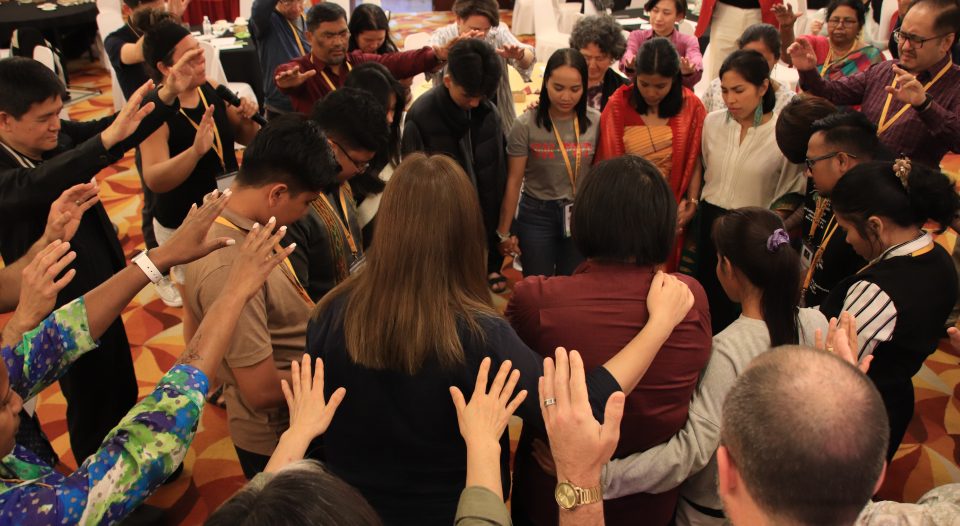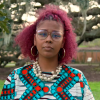I don’t quite know how I, the program director for African Descent Ministries, ended up at the Asian Lutheran International Conference (ALIC), but nothing could have prepared me for the blessing it was to witness it.
Along with me on this journey were Aja, a multiethnic woman of African descent; Mau, a queer nonbinary multiethnic person of Asian descent; and Nia, a queer nonbinary person of Indian descent (last names of some participants withheld). Aja and Mau, both pastors’ kids, left the church after witnessing and experiencing the poor treatment of young people and people of color in the ELCA. Nia, not Lutheran, had labored for the ELCA Youth Gathering for three cycles and was a former Global-Local musician.
Why invest in nonbelievers and people who have rejected the institution?
The conference theme, “Lift Every Voice,” was inspired by the Black National Anthem and became a refrain sung nearly daily by Aja and me. This was allyship.
A Pentecost story
ALIC was an intense mix of the Asian diaspora. Asian Americans arrived with varied lived experiences. Some migrated to the United States as young adults. Some were born in the States to immigrant parents while others had a family history of international adoption. Some of our international colleagues were political and religious refugees. Others embodied multiple identities, such as being of Chinese descent, while nationals of other Asian countries. A few were Indigenous leaders.
The conference was in English, but the walls whispered in Bahasa Indonesia, Hindi, Taiwanese, Japanese, Khmer, Lao, Thai and Burmese. It was the Pentecost story. ALIC embraced hymns and praise music from across the continent. Everyone prayed in the tongues of their hearts. Roll calls sounded like biblical joyful noises. It was holy. It was whole.
On our first day, I reconnected with Pastor Dee, who had just met her maternal family in Thailand. Dee, a biracial Asian American, heard her mother’s adoption story firsthand and learned she came from a family
of Christian pastors. It was as if fragments of her identity were resizing, adjusting into new understanding.
ALIC hosted an 80-person event for people who love Jesus deeply and have mastered a contextually specific method of theological education, evangelism and church-sponsored social enterprise.
During our first lunch together, Aja, Mau, Nia, Samantha and Rachel—mostly children of immigrants—spoke about identity. Samantha shared her struggle with calling herself Cambodian. Born in the United States to Cambodian parents, she wondered if she could claim that identity. Aja, as a biracial Liberian American, understood. Neither Samantha nor Nia spoke their parents’ languages fluently but knew common phrases. Yet, they didn’t know how to say, “I love you.” Their bond solidified in shared experiences, through demonstrations of love, concern, conflict and forgiveness.
I rarely hear this conversation outside the African Descent community. As an African American who grew up around Caribbean immigrants, I’ve long grappled with my relationship to being American. Social media has amplified discourse on the African diaspora’s connection to the continent. It never occurred to me that some Asian Americans might feel a disconnect from Asia, unlike the way Black culture often claims a strong tie to Africa. My cultural understanding of race and ethnicity is not universal and not applicable to most of the Global South.
ALIC exposed my blind spots, particularly around religious minorities. While Lutherans are a minority in the United States, the country remains culturally Christian. In contrast, many global partners lived as religious minorities in Muslim-majority nations, sharing stories of church growth and evangelism methods held in tension with this reality. I struggled with discomfort, shaped by post-9/11 Islamophobia in the United States, which hindered my ability to fully feel their experiences.
An intentional choice
Being Christian is an intentional choice for our global partners, often requiring lifelong explanation and resilience. Many were new converts, while others were generations-deep Lutherans. ALIC hosted an 80-person event for people who love Jesus deeply and have mastered a contextually specific method of theological education, evangelism and church-sponsored social enterprise. Survival and resistance fuels their innovation.
One of the most profound moments came when Khader El-Yateem, executive director of ELCA Service and Justice, led a Bible study, speaking about grace and forgiveness through his experience as a political prisoner under Israeli occupation. His story of witnessing God’s presence through an Israeli soldier gifting him chocolate while imprisoned left the room in tears. Nia, deeply involved in New York-based pro-Palestinian movements, was so convicted by the gift that El-Yateem is to the ELCA.
Later, Aja, Mau and Samantha realized they had grown up together in the church. Samantha pulled up a 2009 Multicultural Youth Leadership Event photo of the Asian Pacific Islander affinity group. Most of the 20-plus youth have since disengaged from church leadership. The realization hit hard: they should be the ones inheriting events like ALIC. Instead, many young leaders have been lost, feeling let down by the ELCA, leaving fewer of us to carry the water.
We reflected on the many pipelines that once existed for young people to grow into church leadership roles. We were among the last to experience those opportunities. Repentance is necessary.
Connections to heritage
Meanwhile, Nia connected with an aunty from Myanmar, another Indian woman who had built a new life. When Nia complimented her hair clip, the next day the woman carefully placed it in her hands—a deep embrace, a blessing. Conversations over lunch with Indian Lutheran leaders like Moses Penumaka, director for Theological Education for Emerging Ministries at Pacific Lutheran Theological Seminary, Berkeley, Calif., and the Rajashekar families revealed to Nia a new connection to their heritage.
Some evenings, Nia returned to our room in tears, overwhelmed by discovering a Lutheran Indian identity. What does it mean for J. Paul Rajashekar, an emeritus professor of systematic theology at United Lutheran Seminary, Gettysburg, Pa., to come from the same town as Nia’s father, share the same family name as their ancestors, and to be confronted with a new understanding of the Christian movement in a vastly Hindu community? Why did God keep leading Nia into these Lutheran spaces?
Restoring relationships is our Christian duty.
Beyond the hotel, ALIC offered immersion experiences to deepen our understanding of Malaysia and Lutheranism in Southeast Asia. We visited the Sabah Theological Seminary, perched atop the Mountain of Prayer and overlooking the lush forests of Kota Kinabalu. The seminary provided theological education in English, Chinese and Bahasa Malay—a rarity in the region.
We toured the Kota Kinabalu Floating Mosque in Sabah and the Mari Mari Cultural Village, learning about Malaysian tribes. Days of theological reflection merged with cultural exploration. If I arrived hungry for knowledge, I left nourished.
After ALIC, our group traveled to Singapore to meet with members of the Lutheran church there. Synthia, a Myanmar national living in Singapore, joined us for dinner. What we expected to be a casual meal revealed an uncomfortable truth. Synthia had essentially sought asylum. A vocal feminist, religious minority and child of Indian immigrants, she had criticized her government, making it unsafe to return home. She had built a good life in Singapore but could not see her parents regularly. The reality sobered us. While I don’t feel safe in the United States as a vocal Black woman, I am not yet contemplating asylum.
In Singapore, we processed our experiences. Aja and Mau found ALIC a gentle reintroduction to faith. The elders treated us with empathy. Uncles traded lemongrass for manuka honey. Aunties shared their struggles as clergywomen. Cousins gifted us with Bible key chains and Taiwanese paperweights. Our kin unapologetically preached about affirming gender and sexuality in a room of people from anti-LGBTQIA+ communities. Young adults facilitated thoughtful workshops. It felt good to be in community.
ALIC had a profound impact. The work of Asian and Pacific Islander Ministries created something immeasurable by church attendance: Perhaps we need a new metric to gauge church impact. Aja, Mau and Nia may never become regular churchgoers or tithers, but they will remain friends of the ELCA. They will support and labor for the church in ways we may not yet realize.
So, why invest in nonbelievers and those who have left the institution? Our faith is not confined by our polity. Our relationships extend beyond membership. As a product of the last generation of Lutheran Youth Organization leaders, I believe in reconciliation. People don’t leave community without reason.
Restoring relationships is our Christian duty. If I am an extension of the ELCA by job title, I must be the church I wish to see. We can’t discard our young people and people of color when they challenge us. The church must center restorative practices. That is our Christian call. Faith alone. Grace alone. Christ alone.





